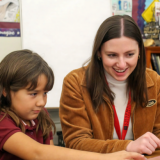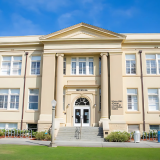Meet Rodney Hume-Dawson, Ph.D. Candidate at Chapman University
February 20, 2014
Chapman University
Rodney Hume-Dawson is an emerging scholar in Education and Disability Studies. He is a certified English Educator in Los Angeles, California. He holds a Bachelor’s degree in English and Philosophy, a Master’s in Teaching and Curriculum. He is on the final stages of his
Ph.D. in Education with emphasis on Disability Studies at Chapman University.
His dissertation is a phenomenological inquiry on the resilience of people with poliomyelitis. Rodney recently completed a book chapter titled:
A Spiritual and Transformative Perspective on Disability
that was published in a book edited by Wappett and Arndt, entitled:
Emerging Perspectives on Disability Studies
this past fall. In addition to working on his dissertation, Rodney is currently working on another book chapter that will be published in a book called
Barriers & Belonging: Student Narratives of Disability
,
sometime next year.
Rodney has lived with a physical disability almost all his life. He was diagnosed with poliomyelitis at the age of eighteen months old in Freetown, Sierra Leone, West Africa, where he was born and raised. The polio left him “paralyzed” from his waist down. In spite of his obvious impairment, his mother raised him to believe that “with God all things are possible,” and that has been his greatest source of energy and inspiration since he was a child. In an environment where children like Rodney were sometimes removed from society and placed in hospitals or institutions, Rodney’s parents were wise and courageous enough to take a different approach. His parents’ determination for him to be educated and Rodney’s own appetite for knowledge has led him to his current research on the resilience of polio survivors.
Rodney’s research primarily focuses on improving our understanding of the perceptions and experiences of polio survivors as they move into old age and become more vulnerable to post-polio syndrome and other complications of aging. The phenomenological inquiry is important because we still need to deepen our knowledge base about those individuals who are dealing with the consequences of polio. While polio has been controlled in much of the world, the pool of polio survivors remains sizable. Knowledge about how polio survivors construct their experiences and give meaning to the challenges they face is critical to improving the social and medical support available to them in contemporary America. The research is also timely because of the simple reality that every year sees a reduction in the number of polio survivors available in the United States to participate in such research. It is imperative that the research Rodney is conducting be done so that we can learn about polio survivors’ lived experiences.
Rodney is uniquely positioned to undertake such a study because of his own insider status. As a polio survivor himself, he will be able to bring in a background of similar life experiences to this study. His warmth and passion for changing perceptions about people with disabilities is clearly evidenced in his work because of the insights that he has as someone living with such experiences, both as a child and young adult in Sierra Leone and as an adult in the place he has called home for 17 years-Southern California. Rodney brings an intimacy to his research that spans these two continents. His current research promises to enrich our understanding even more, as it chronicles the experiences of over 6 individuals living with polio.
Rodney hopes to continue working on thought-provoking issues relating to disability, ability and normalcy. He also intends to challenge some of the limited constructions of disability including participation, independence, beauty, spirituality and personhood. His goal is to become a faculty member at a reputable institution where he will be able to further his research and make a difference in the lives of people with disabilities. Rodney’s major ambition is to teach courses that can help people to understand the essence of disability, its connections and significance to education, the social sciences, and many other disciplines, and why it is more of a human phenomenon than the deviance that some people think it is. Rodney’s K-12 teaching expertise makes him fully equipped to teach courses within several departments, including teacher education and special education in schools of education.


